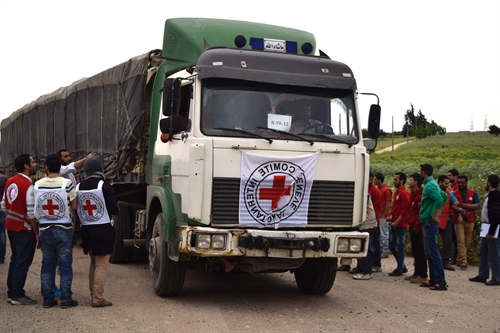.jpg)
.jpg)
Aid groups launched their largest humanitarian delivery yet in war-torn Syria on Thursday after the UN evacuated hundreds of besieged residents, intensifying relief efforts even as peace talks falter.
 |
| ICRC officials watch as a truck from the Red Crescent and International Committee of the Red Cross (ICRC) carrying international aid crosses into the rebel held village of Teir Maalah, on the northern outskirts of Homs, as they make their way to Al-Rastan, north of the central Syrian city of Homs, on April 21, 2016. -- AFP/VNA Photo |
BEIRUT – Aid groups launched their largest humanitarian delivery yet in war-torn Syria on Thursday after the UN evacuated hundreds of besieged residents, intensifying relief efforts even as peace talks falter.
The two operations were a rare sign of humanitarian progress in Syria, where the brutal five-year war has left 270,000 dead as a partial ceasefire hangs by a thread.
The dire humanitarian situation had even stalled UN-backed peace talks in Geneva, with the opposition walking away in frustration at sieges and attacks on civilians.
UN envoy Staffan de Mistura told reporters in Geneva that Thursday’s developments showed "modest but real progress".
"If humanitarian aid increases, as there should be, and the cessation of hostilities goes back into what we consider a hopeful mood, that would certainly help the political discussions," he said.
Aid groups began delivering medical and food aid to 120,000 people in and near the besieged rebel-held town of Rastan.
"The people have suffered terribly," said Majda Flihi, who led a team from the International Committee of the Red Cross into the area.
"Peoples’ livelihoods, especially farming and raising livestock, have been severely affected. Damage to the town’s irrigation infrastructure has made the situation even worse," she said.
The ICRC said items for the provision of clean water were also part of the aid delivered in coordination with the Syrian Arab Red Crescent and the United Nations.
"More aid should be delivered in the coming days," it said.
ICRC spokesman Pawel Krzysiek said it was "the largest joint humanitarian convoy we have done in Syria so far".
The last ICRC delivery was in 2012, the same year rebels seized the town in central Homs province.
Major medical evacuation
Both the rebels and regime have used besiegement as a weapon of war in Syria, and more than four million people live under siege or in hard-to-reach areas.
On Thursday, the UN completed a major evacuation of hundreds "in urgent need of life-saving medical attention" and their families, from four other besieged towns.
The carefully synchronised operation began late Wednesday and lasted throughout the night.
It saw 250 evacuees brought out of the rebel-held towns of Madaya and Zabadani near Damascus and then transported to Idlib city.
The same number left Fuaa and Kafraya, pro-government towns under siege by Islamists, and travelled to the regime’s coastal bastion in Latakia.
Jihadist factions like the Islamic State group and Al-Qaeda are not party to an increasingly strained truce between the government and non-jihadists rebels.
The "cessation of hostilities" came into force on February 27 and initially saw a significant reduction in bloodshed.
Although none of its signatories have officially declared the truce dead, violence has surged in recent weeks, particularly in Idlib province and the battleground northern city of Aleppo.
On Tuesday, suspected government strikes on the Idlib province towns of Maaret al-Numan and Kafranbel hit two markets, killing at least 44 civilians, said the Syrian Observatory for Human Rights.
The strikes drew a furious reaction from the opposition High Negotiations Committee (HNC) which said they vindicated its decision to suspend its participation in the Geneva talks.
’Shred of humanity’
The Britain-based Observatory reported new air strikes on Thursday – some involving barrel bombs infamous for their indiscriminate nature – against rebel-held towns in Homs province that are covered by the truce.
The UN as well as Russia and the United States – which brokered the truce – are desperate to see it hold long enough to secure a negotiated settlement of the five-year conflict.
But the HNC walkout has left a political solution increasingly distant, and has emboldened the government delegation to take a tougher line.
The HNC’s members were set to all leave Geneva by Friday, an opposition official told AFP.
HNC chief negotiator Mohammed Alloush said the regime would have to "stop its massacres and release thousands of detainees so that it could have a shred of nationalism and humanity."
"Then, the talks can start again," he told journalists as he left his hotel in Switzerland.
The government’s chief representative in Geneva, Bashar al-Jaafari, said his delegation would stay the course but that only opposition members "who reject terrorism (and) who do not work for the sake of a foreign agenda" would be permitted to join a "broad-based unity government".
That would appear to rule out the HNC, which he described as a group of "extremists, terrorists and mercenaries" working for Saudi Arabia and Turkey, the opposition’s main backers. – AFP